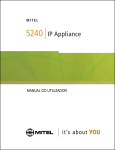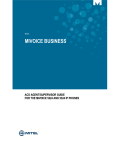Download Mitel 5140 User guide
Transcript
MITEL 5140 IP Appliance USER GUIDE 3300 ICP - 7.0 Contents 1 ABOUT THE 5140 IP APPLIANCE 5140 IP Appliance Features 2 TIPS FOR YOUR COMFORT AND SAFETY 3 Don't cradle the handset! Protect your hearing Adjusting the viewing angle 3 3 3 FOR USERS ON RESILIENT 3300 ICP SYSTEMS 3 CUSTOMIZING YOUR 5140 APPLIANCE 4 Ringer Control Handset, Headset and Speakerphone Volume Display Contrast Control Quick Key Programming Language Change 4 4 4 5 5 6 MAKING AND ANSWERING CALLS Make a call Answer a call End a call Redial Redial - Saved Number Speed Call - Personal Handsfree Operation Auto-Answer 6 6 6 6 6 7 7 8 -i- 8 CALL HANDLING Hold Transfer Conference Conference Split Add Held Swap Call Forward Call Forward - Remote Call Forward - End Chaining Call Forward - Forced Call Forward - Override Messaging - Advisory Messaging - Callback 8 9 9 9 10 10 11 12 13 13 13 13 14 16 USING OTHER FEATURES Account Codes Callback Attendant Call Hold - Remote Retrieve Call Park Call Pickup Campon Do Not Disturb Override (Intrude) Paging Direct Paging Reminder Headset Operation Headset Operation (with Feature Control Switch) Music Calculator Group Paging / Meet Me Answer Trunk Flash Record a Call Hot Desking Tag Call -ii- 16 17 17 18 19 19 20 20 20 21 22 22 23 23 24 25 26 27 28 29 30 USING THE APPLICATIONS Personal Directory Corporate Directory Call Logs Speed Dials Bookmarks Online Services Mitel Networks IrDA Module Speech Recognition 30 31 32 33 33 34 35 36 37 USING VISUAL VOICE MAIL About the Voice Mail main screen Sorting Messages Playing messages Making and Replying to Messages Recording Memos Creating Distribution Lists Changing your Greetings, Name and Passcode -iii- 38 39 40 41 43 43 44 ABOUT THE 5140 IP APPLIANCE The Mitel Networks 5140 IP Appliance is a digital telephone that also serves as a gateway to your company network, providing you with real-time access to applications and services such as web browsing, directory management and visual voice mail. The 5140 IP Appliance features a full-duplex speakerphone that allows you the freedom to work at your computer during calls; the six command keys and nine programmable quick keys provide convenient access to features. Programming the quick keys is simple thanks to the easy-to-follow screen prompts. For even easier programming use the Desktop Tool, a companion application for the 5140 IP Appliance that runs on a PC. -1- 5140 IP Appliance Features Feature 1 - Ringing Indicator 2 - Audio Device Controls 3 - Command Keys Function flashes to signal an incoming call. switches between headset and handset operation; mutes the handsfree microphone; and adjusts the sound level. invokes the command or function described by the adjacent label. The command or function changes according to the screen you are in. 4 - Telephony Feature enables and disables Handsfree operation; places Keys calls on Hold. The Speech Recognition key dials the automated attendant or other service as determined by system programming. 5 - Application Keys accesses functions, services, and applications provided on the 5140 IP Appliance. See Using the Applications for more information. 6 - Message Indicator flashes when you have a new voice message. 7 - InfraRed links the 5140 IP Appliance to a Palm® Handheld™ Transceiver Lens Personal Digital Assistant (PDA) enabling users to speed dial calls from their Palm OS address book or to access features and telephone numbers programmed on their own extension. For more information on using the PDA, refer to the Mitel Networks PDA and IrDA Module technical documentation. 8 - Display Screen provides a large, high-resolution viewing area for ease of use. 9 - Quick Keys invoke the command or function indicated by the adjacent label. The bottom quick key is always your Prime Line; the remaining quick keys are programmable. 10 - Navigation Keys scrolls the display to the next or previous page. The left arrow key backspaces, erasing any characters to the left. The right arrow key inserts spaces. OK performs the default command on a selected item. 11 - Dialpad Keys used for dialing when in phone mode and to enter characters when in application mode. -2- TIPS FOR YOUR COMFORT AND SAFETY Don't cradle the handset! Prolonged use of the handset can lead to neck, shoulder, or back discomfort, especially if you cradle the handset between your ear and shoulder. If you talk on the phone a lot, you may find it more comfortable to use a headset. See Headset Operation for more information. Protect your hearing Your 5140 IP Appliance has a control for adjusting the volume of the handset receiver or headset. Because continuous exposure to loud sounds can contribute to hearing loss, keep the volume at a moderate level. Adjusting the viewing angle The stand built into your 5140 IP Appliance tilts to give you a better view of the keys. To adjust the viewing angle: 1. Depress the button on the stand at the back of the set. 2. Slide the stand in or out to achieve the desired angle. 3. Release the button. FOR USERS ON RESILIENT 3300 ICP SYSTEMS If during a call, you hear two beeps repeated every 20 seconds it means that your phone is switching to a secondary 3300 ICP system. The call continues but the keys and features on your phone stop working. The keys and most features begin working again after you hang up. Normal operation resumes when your phone switches back to the primary system. If your phone is idle and switched to the secondary system, you'll see a flashing rectangle on the display. The rectangle remains until the switch to the primary system is complete. -3- CUSTOMIZING YOUR 5140 APPLIANCE Ringer Control To adjust the Ringer Volume while 5140 IP Appliance is ringing: z Press the volume control buttons located above the display. To adjust the Ringer Volume or Pitch while the 5140 IP Appliance is idle: 1. 2. 3. 4. 5. Press SETTINGS. Press the More command key. Press the Ring Adjust command key. Press the Ringer Vol or Ringer Pitch command key. Press the volume control buttons located above the display to adjust the volume or pitch. 6. Press SETTINGS. Handset, Headset and Speakerphone Volume To adjust the volume of the active receiver: z Press the volume control buttons located above the display. Display Contrast Control To adjust the Display Contrast while the 5140 IP Appliance is idle: z Press the volume control buttons located above the display. -4- Quick Key Programming You can program your quick keys using the 5140 IP Appliance or the Desktop Tool. The Desktop Tool is a companion application for the 5140 IP Appliance that runs on a PC. It allows you to label the quick keys that you programmed. The labels appear on the display and cannot be assigned from the 5140 IP Appliance itself. To display the feature that is currently programmed to a quick key: 1. Press SETTINGS. 2. Press a quick key. 3. Press another quick key or SETTINGS to exit the Settings menu. To program a quick key: 1. Press SETTINGS. 2. Press a quick key. 3. Do one of the following: To re-program the key, press the Change Key command key, and then select a new feature. To clear the key, press the Clear Key command key. 4. Press SETTINGS to exit the Settings menu. Notes: 1. Use the Desktop Tool to assign labels to the quick keys. 2. When programming speed dial numbers you can insert a pause for dial tone in the number by pressing Hold at the appropriate point; this inserts a four second delay, for example, 1234P5678. The system dials 1234, waits four seconds, then dials 5678. If required, you can insert multiple pauses. Language Change To change the language on the display: 1. 2. 3. 4. 5. Press Press Press Press Press SETTINGS. the More command key until Language appears. the Language command key. the command key for the desired language. SETTINGS to exit the Settings menu. -5- MAKING AND ANSWERING CALLS Make a call 1. If necessary, press PHONE VIEW to exit the current application. Press the quick key associated with the party you want to call. Dial the number using the dialpad keys. 2. Continue the call using the speakerphone or lift the handset. Answer a call Do one of the following: z Lift the handset or press HANDSFREE. The current application will remain open. z Press PHONE VIEW to exit the current application, and then lift the handset or press HANDSFREE. Pressing PHONE VIEW will allow you to see the caller information. End a call Do one of the following: z To end a handsfree call, press the Hang Up command key. z To end a handset call, replace the handset. Redial To redial the last number that you manually dialed: 1. Lift the handset. 2. Press Redial command key. Redial - Saved Number To save the last number that you manually dialed: 1. Lift the handset. 2. Dial **79. To Redial a saved number: 1. Lift the handset. 2. Dial *6*. -6- Speed Call - Personal To store a personal Speed Call number: 1. 2. 3. 4. 5. Press SETTINGS. Press the More command key. Press Speed Call command key. Press a quick key that isn't a line key. Do one of the following: To enter a new number, dial the number. To enter the last number dialed, press the Redial command key. 6. If you want the number to be private, press the Make Private command key. 7. Press the Save command key. 8. Press SETTINGS to exit the Settings menu. Note: Use the Desktop Tool to assign labels to the quick keys. To dial a stored personal Speed Call number: 1. Lift the handset. 2. Press a Speed Call quick key. Handsfree Operation To enable Handsfree Operation: z Press HANDSFREE. To switch from Handsfree to Handset operation during a call: z Lift the handset. To temporarily disable/enable the microphone during Handsfree Operation: z Press MICROPHONE (the microphone LED turns on when the microphone is disabled). To end a Handsfree call: Do one of the following: z Press HANDSFREE. z Press the Hang Up command key. -7- Auto-Answer This feature automatically connects internal calls to your extension. Calls are announced by a single burst of ringing; then, the microphone and speaker are activated and the call is answered. You can continue the call handsfree or use the handset. To enable or disable Auto-Answer: z Press Auto-Answer quick key. (See Quick Key Programming for instructions on programming features to your phone.) To answer a call when you hear ringing: z Communicate by using the speaker and the microphone. To end a call: z Press the Hang Up command key. -ORWait for the caller to hang up. CALL HANDLING Hold To place a call on Hold: z Press HOLD. To retrieve a call from Hold: 1. Lift the handset. 2. Press the line key with the flashing icon. To retrieve a call from Hold at another extension: z Press the flashing line key. -ORDial **1 and the number of the extension that placed the call on Hold. -8- Transfer To Transfer an active call: 1. Press Trans/Conf command key. 2. Dial the number of the next party. 3. Do one of the following: To complete the Transfer, hang up or press the Release Me command key. To announce the Transfer, wait for an answer, consult, and then hang up. To return to the first call before completing the transfer, press the Back To Held or Trade Calls command key. Conference To set up a Conference when a two-party call is already established, or to add another party to an existing Conference: 1. 2. 3. 4. Press Trans/Conf command key. Dial the number of the next party. Wait for an answer. Press the Trans/Conf command key. To leave a Conference: z Hang up. Conference Split To split a conference and speak privately with the original party: z Press the Split command key. -9- Add Held To move a call on Hold to another line appearance: 1. Press the available line key. 2. Press the Add Held command key. 3. Press the line key with the flashing icon. To add a call on Hold to an existing conversation or conference: 1. Press the Add Held command key. 2. Press the line key with the flashing icon. Swap To call another party when you are in an established two-party call: 1. Press Trans/Conf. 2. Dial the number. To alternate between the two parties: z Press the Trade Calls command key. -10- Call Forward Call Forward lets you redirect incoming calls to an alternate number when your phone is busy, when you're not answering, or all the time. "Busy" (Internal, External, and Both) redirects your calls when your telephone is busy. "No Answer" (Internal, External, and Both) redirects your calls after several rings if you don't answer. "Always" redirects all incoming calls regardless of the state of your telephone. Note: For information about using the To Me command key, see Call Forward - Remote. To program Call Forward: 1. 2. 3. 4. 5. 6. 7. 8. Press SETTINGS. Press the More command key. Press the Forwarding command key. Select a type of Call Forward. (For information about Call Forward To Me, see Call Forward - Remote.) Do one of the following: To forward only internal calls, press the Internal command key. To forward only external calls, press the External command key. To forward both internal and external calls, press the Both command key. Dial the destination number. Press the Save/On or press the Save/Off command key. Press SETTINGS to exit the Settings menu. To turn Call Forward on and off (once it has been programmed): 1. 2. 3. 4. Press Press Press Press the Forwarding command key. the Next command key until the type of Call Forward appears. the Turn Fwd On or press the Turn Fwd Off command key. SETTINGS to exit the Settings menu. -11- To cancel Call Forward: 1. 2. 3. 4. 5. 6. Press SETTINGS. Press the More command key. Press the Forwarding command key. Select the type of call forwarding. Press the Save/off command key. Press SETTINGS to exit the Settings menu. Call Forward - Remote To forward calls from a remote extension to your extension: 1. 2. 3. 4. 5. 6. 7. Press SETTINGS. Press the More command key. Press the Forwarding command key. Press the To Me command key. Dial the number of the remote extension. Press the Save/On command key. Press SETTINGS to exit the Settings menu. To cancel Call Forward - Remote from the extension that set it: 1. 2. 3. 4. Lift the handset. Dial **77. Dial the number of the remote extension. Hang up. To cancel Call Forward - Remote from the extension that was forwarded: 1. Press Forwarding command key. 2. Press the Turn Fwd Off command key. 3. Press SETTINGS to exit the Settings menu. -12- Call Forward - End Chaining To ensure that calls do not get forwarded again by the destination number: 1. Lift the handset. 2. Dial 64. 3. Hang up. To again allow calls to be forwarded by the destination number: 1. Lift the handset. 2. Dial **73. 3. Hang up. Call Forward - Forced To force an incoming call to be forwarded: z Press the Forward Call command key. Call Forward - Override To override Call Forward and ring an extension: 1. Lift the handset. 2. Dial *1*. 3. Dial the extension number. Messaging - Advisory This feature displays a message on a calling extension's phone to say that you are, for example, on vacation, off sick, or in a meeting. To turn Messaging - Advisory on or off: 1. Do one of the following: Press SETTINGS. Press the Messaging command key. 2. Press the More command key. 3. Press the Messaging command key. 4. Press the Advisory command key. 5. Press the Next Msg command key until the desired message appears. 6. Press the Turn Msg On or Turn Msg Off command key. 7. Press SETTINGS to exit the Settings menu. -13- Messaging - Callback To leave a message waiting indication on a telephone when you hear busy or ringback tone: z Press Leave A Msg command key. To respond to a message waiting condition on your telephone: Do one of the following: z Press Messaging followed by Call. z Lift the handset, and then press Messaging. A call is placed to the message sender (voice mail system or extension user) that left the oldest message. To read messages before responding: 1. Press the Messaging command key. 2. If a password is required, enter your password and press the Enter command key. 3. Press the Read Message command key. 4. Press the Call Me Back command key. 5. Do one of the following: To call the message sender, press the Call command key. To delete the message, press the Erase Msg Call command key. To view the next message, press the Next Msg command key. To check for messages from a remote extension: 1. 2. 3. 4. 5. Press the Messaging command key. Press the Remote Msgs command key. Dial your extension number. Press the Enter command key. If a password is required, enter your password and press the Enter command key. 6. Press the Read Message command key. -14- To set a password (up to 7 digits, not including 0): 1. 2. 3. 4. 5. 6. 7. Press Press Enter Press Enter Press Press the Messaging command key. the New Password command key. a password. the Enter command key. the password again. the Enter command key. SETTINGS to exit the Settings menu. To change or clear your password: 1. 2. 3. 4. 5. 6. 7. 8. Press the Messaging command key. Press the New Password command key. Enter your current password. Press the Enter command key. Press the New Password command key. Enter your current password. Press the Enter command key. Do one of the following: To change your password, enter a new password and press the Enter command key. To clear your password, press 0. 9. Press SETTINGS to exit the Settings menu. -15- USING OTHER FEATURES Account Codes An account code is a series of digits that you assign to your calls, usually for accounting purposes. The code identifies the account in the call records that your system generates. A forced account code is usually entered from another extension, enabling you to use features or make calls that the extension otherwise could not. If you want this feature, ask your System Administrator. To use Forced Account Codes: 1. Lift the handset. 2. Dial the Account Code digits. 3. Do one of the following: To submit the Account Code, press the # key. To correct an entry error, press the command key. To cancel, press the Cancel command key. To enter an Account Code during a call: 1. Press the Account Code command key. 2. Dial the account code digits. 3. Do one of the following: For a verified account code, press the Verify/Save command key. For a non-verified account code, press the Save command key. -16- Callback To request a Callback when you reach a busy or unanswered station: z Press the Call Me Back command key. To answer a Callback: z Lift the handset. To view and/or cancel outstanding Callbacks: 1. 2. 3. 4. 5. Press SETTINGS. Press the More command key. Press the Callbacks command key. Press the Next and Previous command keys (if required). Do one of the following: To cancel a callback, press the Cancel command key. To call the number shown, press the Call Again command key. Attendant Call Hold - Remote Retrieve To retrieve a call placed on Hold by the attendant: 1. Lift the handset. 2. Dial *23. 3. Dial the digits announced by the attendant. -17- Call Park The Call Park feature allows you to place a call in a special hold state. You, or someone else, can then retrieve the call from any extension in the system. After parking the call, the system can automatically connect you to paging equipment so that you can announce the call to the requested party. To park an active call: 1. Do one of the following: Press the Call Park feature key (must be programmed) Press the Trans/Conf command key, and then dial *7#. The display shows the name or number of the parked caller (if available), followed by the park destination and parking spot index (if applicable). Example: John Smith @1234 @02. 2. Dial the directory number on which to park the call (not required if the number is programmed to the Call Park feature key). 3. To inform a user that a parked call is waiting, do one of the following: If automatic paging is enabled, announce the call and the park retrieve digits shown on the display. If automatic paging is disabled, press the programmed Page key, or dial **9, followed by the Paging zone number (if required). Then, announce the call and park retrieve digits shown on the display. Note: Paging over a loudspeaker is not permitted in handsfree mode; you must use the handset or headset. To retrieve a parked call: 1. Do one of the following: Dial *8#. Press the Call Park - Retrieve feature key (must be programmed). 2. Dial the directory number on which the call is parked (not required if the number is programmed to the Call Park feature key). 3. If there are multiple calls parked on the number, dial the two-digit index number to retrieve a specific call, or # to retrieve the longest parked call. -18- Call Pickup To answer a call that is ringing at another extension in your Pickup Group: 1. Lift the handset. 2. Press the Pickup Call command key. (See Quick Key Programming for instructions on programming features to your phone.) To answer a call that is ringing at a extension not in your Pickup Group: 1. Lift the handset. 2. Dial **6. 3. Dial the number of the ringing station. Campon To Campon to a busy station: z Press the I Will Wait command key. To retrieve a call when you hear Campon tone: 1. Press the Call Waiting command key. 2. Press the Trade Calls command key. -19- Do Not Disturb To activate or deactivate Do Not Disturb: z Press the Do Not Disturb quick key. To activate Do Not Disturb from a remote extension: 1. 2. 3. 4. Lift handset. Dial **5. Dial the number of the station to which Do Not Disturb is to apply. Hang up. To deactivate Do Not Disturb from a remote station: 1. Lift handset. 2. Dial ##5. 3. Dial the number of the station with Do Not Disturb activated. (See Quick Key Programming for instructions on programming features to your phone.) 4. Hang up. Override (Intrude) To use Override when you encounter busy tone: z Press the Intrude command key. To use Override when you encounter Do Not Disturb tone: z Press the Ring Anyway command key. Paging To use Paging: 1. Lift handset. 2. Press the Pager quick key. (See Quick Key Programming for instructions on programming features to your set.) 3. Dial the Paging zone number (if required). 4. Make the announcement. -20- Direct Paging Direct Paging allows you to page a party through their telephone speaker. To page another extension user: 1. Lift the handset. 2. Press the Direct Paging quick key. (See Quick Key Programming for instructions on programming features to your set.) 3. Dial the extension number. 4. Speak to the dialed party after the tone. If Handsfree Answerback has been turned on at your phone and you receive a Direct Page while your phone is idle, or while you are on a handset or headset call, a handsfree call will automatically be established after a single burst of tone. The following instructions assume that Handsfree Answerback is not enabled on your phone. To answer a Direct Page (indicated by a single burst of tone): z Lift handset. - OR Press MICROPHONE. To answer a page while using the handset: z Press MICROPHONE. To enable or disable Handsfree Answerback: z Press MICROPHONE while your phone is idle. -21- Reminder To program a Reminder: 1. 2. 3. 4. 5. Press Press Enter Press Press SETTINGS. the Reminder command key. the time in 24-hour format. the Save command key. SETTINGS to exit the Settings menu. To view, change, and/or cancel a pending Reminder: 1. Press SETTINGS. 2. Press the Reminder command key. 3. Do one of the following: To change the Reminder, enter the new time and press the Save command key. To cancel the Reminder, press the Cancel command key. To exit without canceling the Reminder, press SETTINGS to exit the Settings menu. To acknowledge a Reminder when your phone rings once: z Press the Acknowledge command key. Headset Operation To enable Headset Operation: z Press the Headset key located above the display. To answer a call (when Auto Answer is disabled): z Press the line key with the flashing icon. To hang up: z Press the Hang-Up command key. To disable Headset Operation: z Press the Headset key. -22- Headset Operation (with Feature Control Switch) IMPORTANT NOTE: Mitel Networks Headsets with Feature Control Switch must be installed in the dedicated headset jack on the back of the phone. Installation will disable your handset microphone. Disconnecting the headset at the jack or at the quick-disconnect plug restores handset operation. If handset operation is required for an extended period of time, you should press the Headset feature key to return the telephone to handset mode. To enable Headset Operation: z Press the Headset key. To answer a call: z Press line key with the flashing icon. -ORQuickly press and release the headset's feature control switch. To mute the headset microphone: z Press and hold the headset's feature control switch. To hang up: z Press Hang-up command key. -ORQuickly press and release the headset's feature control switch. To disable Headset Operation: z Press the Headset key. Music To turn Music on and off when the phone is idle: Do one of the following: z To turn the music on, press the Music On command key. z To turn the music off, press the Music Off command key. -23- Calculator To use the Calculator: 1. Press SETTINGS. 2. Press the Calculator command key. 3. Use the telephone keypad as the numeric keypad. The * key is used as a decimal point key. The following operations as well as the Clear Entry/Clear (CE/CLR) and another decimal point are presented as command keys: ( x,÷, -, +, /, = ) 4. Press SETTINGS to exit the Settings menu. -24- Group Paging / Meet Me Answer Group Paging allows you to page a group of telephones through their built-in speakers. You can belong to as many as three paging groups with one group designated as your "prime" group. When you need to respond to a Group Page but don't know the identity or extension number of the paging party, use the Meet Me Answer feature. You have up to 15 minutes after receiving the page to use Meet Me Answer. To make a Group Page: 1. Lift the handset. 2. Press Direct Page or dial *37. 3. Do one of the following: To page your prime page group, press #. To page a specific page group, dial the page group directory number. 4. Speak to the dialed party after the tone. To respond to a Group Page by using Meet Me Answer: 1. Lift handset. 2. Press the MME quick key or dial *88. (See Quick Key Programming for instructions on programming features to your phone. 3. Do one of the following: To respond to a page from your prime page group, press #. To respond to a page from a specific page group, dial the page group directory number. -25- Trunk Flash The Trunk Flash feature allows you to access Centrex features (if available) while you are talking on an outside call. To flash a trunk while talking on an outside call: 1. 2. 3. 4. Press Trans/Conf. Dial *57 for a single flash or *56 for a double flash. Wait for dial tone. Dial the Centrex feature access code. -26- Record a Call This feature uses your voice mail system to record your telephone conversations. Note: You may be required by law to inform the other party that you are recording the conversation. For specific instructions, consult your System Administrator. To start recording while on a two-party call: z Press the Record Call command key. Note: Your system may be programmed to automatically begin recording external calls when you or the other answers. To pause recording: z Press the Pause command key. To resume recording after pausing: z Press the Resume command key. To stop a recording without saving it: z Press the Stop&Erase command key. To stop and save a recording: z Press the Stop&Save command key. Putting the call on hold saves the recording; taking the call off hold starts a new recording. Depending on system programming, hanging up, or pressing Trans/Conf or a DSS/BLF key, may also save the recording. To listen to a recording: 1. Lift the handset. 2. Access your voice mailbox. 3. Follow the prompts to retrieve the recording. -27- Hot Desking Hot Desking allows you to log into the telephone system from any phone designated as a Hot Desk phone. Simply log in at the phone using your assigned Hot Desk User Extension Number and the phone immediately assumes all your speed dials, features keys, call forwarding setup, and line appearances - even your language preference for the display. Any changes you make to the phone while you are logged in--for example, adding a speed dial--are saved to your personal profile. Logging in activates your profile on any phone that supports Hot Desking. Note: All Hot Desking profiles have 13 programmable keys. If you log into a phone that has a fewer number of keys, the extra ones are "hidden". Only the use of the extra keys is lost, not the features assigned to them. To log into a Hot Desking phone (the phone must be idle): 1. From the Phone View screen, press the HotDesk command key. 2. Press the Login command key. 3. Enter your Hot Desk User Extension Number, and then press the OK command key. To log out of Hot Desking phone (the phone must be idle): 1. From the Phone View screen, press the HotDesk command key. 2. Press the Logout command key. 3. Press the Confirm command key. Note: Your profile can only be active on one phone at a time. If you log in from another phone without logging out from the first one, the system will automatically deactivate your profile on the first phone. Hot Desk Remote Logout A user that has forgotten to log out of a Hot Desking phone can be logged out using any phone that supports Hot Desk Remote Logout. To remotely log out a Hot Desking phone: 1. From the Phone View screen, dial 111. 2. Dial the Hot Desk User Extension Number that you want to log out. -28- Tag Call Tag Call allows you to signal that you are the victim of a threatening or malicious call. Using the tag, your system administrator or telephone company can identify the source of the call and provide this information to appropriate personnel or authorities. CAUTION: Tagging a non-malicious call may result in fines or other penalties. To tag a malicious call: z z z Press the Tag Call quick key while the call is in progress. See "Quick Key Programming" elsewhere in this guide for information on programming a Tag Call quick key to your phone. -ORPress Trans/Conf. Dial *55. If the call was successfully tagged "Thank You" is shown on the display; otherwise, "Not Allowed" is displayed. Note: Tag Call can be used on active two-party calls only. Calls on hold and conference calls cannot be tagged. -29- USING THE APPLICATIONS Personal Directory The Personal Directory provides easy access to your personal address book. The main screen of the directory is your control center for all personal call management. From this screen, you can search entries and make calls. Note: Use the Desktop Tool to add new entries to your Personal Directory. To access the Personal Directory: z Press PERSONAL DIRECTORY. To answer calls while in the Personal Directory: z Lift the handset or press HANDSFREE. Note: To view caller identification, press PHONE VIEW to exit the Personal Directory. To search the directory: z z Press an Index quick key corresponding to the first letter of the person's last name. -ORPress the Search command key, enter the first few letters of the person's name using the dialpad keys, and then press Search Now or OK. Note: To delete a letter, press the left arrow key. To add a space, press the right arrow key. To delete a directory entry: z Use the Desktop Tool to delete entries in your Personal Directory. -30- Corporate Directory The Corporate Directory is created and maintained by your System Administrator. From the Corporate Directory screen, you can perform searches, make a call, and view details on entries in the directory. To access the Corporate Directory: 1. Press ONLINE SERVICES. 2. Press Corporate Directory. To answer calls while in the Corporate Directory: z Lift the handset or press HANDSFREE. Note: To view caller identification, press PHONE VIEW to exit the Corporate Directory. To search the directory: z z Press an Index quick key corresponding to the first letter of the person's last name. -ORPress the Search command key, enter the first few letters of the person's name using the dialpad keys, and then press Search Now or OK. Note: To move backwards and delete a letter, press the left navigation key. To move forward, press the right navigation key. -31- Call Logs Call Logs track up to 60 of your incoming, outgoing, and missed calls. It provides the name of each called or calling party, the date and time of the call, the phone number, call duration, and the number of calls to or from that particular party. To access Call Logs: z Press CALL LOGS. To delete a log entry: 1. In one of the Call Log screens, press the quick key associated with the entry you want to delete. 2. Do one of the following: To delete an entire entry, press the Delete Item command key. To delete all entries from the Call Log screen, press the Delete All command key. Note: If you choose to Delete All, skip step 1. To exit Call Logs: z Press PHONE VIEW. To make an external call from Call Logs: 1. 2. 3. 4. Press the Add Prefix command key. In the first Number to dial field, enter the appropriate prefix. In the second Number to dial field, enter the rest of the phone number. Press the Dial command key. -32- Speed Dials Speed Dials is an application that allows access to a list of phone numbers that you can dial with one or two key presses. Use the Desktop Tool to to add numbers to the list. To make a Speed Dial call: z Press SPEED DIALS, and then press a quick key associated with a speed call that you have programmed through the Desktop Tool. Use the command keys to display additional pages of numbers (if programmed). To exit Speed Dials: z Press PHONE VIEW. Bookmarks Bookmarks is an application that allows quick access to a list of URLs (i.e, Internet addresses). You use the Desktop Tool to program the URLs you want to access. To access Bookmarks: z Press BOOKMARKS. Note: You cannot make calls while you are using Bookmarks. To view a web page: 1. Access Bookmarks. 2. In the Bookmarks main screen, press the quick key associated with the web page you want to view. Note: Use the Desktop Tool to program personal URLs that will be accessed by pressing the associated quick keys. To exit Bookmarks: z Press PHONE VIEW. -33- Online Services Online Services provides access to applications and information programmed by your System Administrator for your use. Online services can include company news and events, and company stock quotes. To access Online Services: z Press ONLINE SERVICES, and then press the quick key associated with the service you want to use. Note: You cannot make calls while you are using Online Services. To exit Online Services: z Press PHONE VIEW. -34- Mitel Networks IrDA Module The Mitel Networks IrDA (Infrared Display Adapter) Module provides a wireless connection between Mitel Networks' IP-based ICP and the Palm Handheld Personal Digital Assistant (PDA). The IrDA Module's Dial by Address Book (DBAB) application enhances the PDA's existing Address Book function by enabling PDA users to select a stored phone number and dial it directly from the PDA. To place a call, point the PDA at the infrared transceiver lens on the 5140 IP Appliance, and then select the PDA's caller identification feature. The IrDA Module's Telephony Features Integration (TFI) application gives your PDA access to the telephony features available on the 5140 IP Appliance. Through this application, you can create "soft" buttons on your PDA that, when activated, emulate the buttons on your 5140 IP Appliance. For more information on using the IrDA Module and PDA, refer to the Mitel Networks IrDA Module technical documentation. To launch DBAB: z From the PDA's main window, tap the Dial by AB icon. To launch TFI: z From the PDA's main window, tap the TFI icon. Note: The first time you launch the TFI application, you will be requested to enter your phone extension number in the TFI Preferences window. -35- Speech Recognition Speech Recognition is an optional feature that allows you to interact with the system using your voice. With Speech Recognition, you can call people by saying their name and interact with the voice mail system using spoken commands. You can take a tutorial from your phone to learn the basics of using Speech Recognition. A user guide is available if you need more assistance. Ask your System Administrator for a copy of the guide. Do one of the following. z Lift the handset, and then press SPEECH RECOGNITION. z Press SPEECH RECOGNITION. -36- USING VISUAL VOICE MAIL Visual Voice Mail is an application that allows you to visually interact with the voice mail system. Before you can use voice mail, you must first set up your mailbox. To set up your mailbox: 1. 2. 3. 4. Press VOICE MAIL. Enter the default passcode ( 999 ). Press the Login command key or OK. Follow the on-screen instructions to create your personal passcode and to record your name and greeting. You can change your mailbox setup at any time by using the Options command on the main voicemail screen. See Changing your Greetings, Name and Passcode for details. To access your mailbox (or other mailboxes on the system): 1. Press VOICE MAIL. 2. Do one of the following: To access your mailbox, enter your passcode. To access another mailbox, enter the mailbox number and passcode. 3. Press the Login command key or OK. To exit your mailbox: 1. Press the More Choices command key. 2. Press the Log Out command key. To access your mailbox while on a call: z Put the call on Hold, and then press VOICE MAIL. To retrieve the call, press PHONE VIEW to exit the voice mail application. To exit the Visual Voice Mail application to make or answer a call: z Press PHONE VIEW. -37- About the Voice Mail main screen The Voice Mail main screen contains a chronological list of the voice messages in your mailbox, with the most recent message listed first. By default, the first message is selected when the main screen opens. You can scroll through the messages by using the Navigation keys. Messages are marked in the following ways: Marker Bold text ! (exclamation mark) Type of Message New (never played) Urgent Confidential (cannot be forwarded) Receipt confirmation (For messages sent by you. To determine who has listened to your message, select it, then press the Play command key.) Want receipt confirmation (For messages sent to you) -38- Sorting Messages By default, messages display in the order in which they were received from most to least recent. You can re-sort your messages to display, z z z new messages first, and then the saved messages, alphabetically according to the sender's name with unknown callers listed at the end, urgent messages first followed by non-urgent messages. Note: Visual Voice Mail shows the caller ID information for calls from internal extensions that have a voice mailbox. All other calls are display as "Unknown Caller." To re-sort messages (applies to current voice mail session only): 1. From the Voice Mail main screen, press the More Choices command key repeatedly, until Sort Options appears. 2. Press the Sort Options command key. 3. Select a sort option using the Navigation keys. 4. Press the Done command key to go back to the Voice Mail main screen. -39- Playing messages To play messages: 1. Access your mailbox. 2. Use the Navigation keys to select the message that you want to play. 3. Press the Play Messages command key. While listening to a Message you can press to skip to the end of message to fast forward five seconds to rewind five seconds go to the beginning of message After listening to a message you can press Play Message Dial Sender to play the message again to call the message sender. When calling outside the system, include the prefix code (usually "9") if one is required to access an external line. Mark as Saved to keep the message. Once a message is marked as Saved, it no longer appears as a new message (i.e. bold). Messages, whether played or not, will appear as new until you mark them as Saved. Forward to send the message to one or more mailboxes. Delete discard the message. Make a New Message to send to one or more mailboxes. Reply to respond with a message to the sender. -40- Making and Replying to Messages To reply to a message: 1. Use the Navigation keys to select the message to which you want to reply. 2. Press the Reply command key. 3. Press the Record a Reply command key. 4. Record your message (see Recording Options below). 5. (Optional) Press the Add Recipients command key to send the reply to other mailboxes in addition to the sender's (see Addressing Options below). 6. Specify Delivery options if required (see Delivery Options below). 7. Press the Send command key to send the message. To make a new message: 1. 2. 3. 4. 5. 6. 7. 8. Access your mailbox. Press the More Choices command key. Press the Make a New Message command key. Press the Record New Message command key. Record your message (see Recording Options below). Enter one or more recipients (see Addressing Options below). Specify Delivery options if required (see Delivery Options below). Press the Send command key to send the message. Recording Options The following quick keys and command keys are available during recording: Press this key to start recording (can be used instead of Record New Message or Record a Reply command key) pause recording stop recording resume a paused recording or replay a completed recording Append Accept Cancel add to your recorded message proceed with sending your message stop recording and discard the message -41- Delivery Options Press this key Urgent Confidential Confirm Receipt to place the message first in the destination mailbox (es) prevent the recepient(s) of your message from forwarding it request notification that your message has been heard Addressing Options You can specify recipients for your messages by entering mailbox numbers, selecting mailbox owners by name, or by using a distribution list. To address messages by Mailbox numbers Do this z z z Name z z z z Distribution list z z z z z Enter the mailbox number, and then click the Add Mailbox to Recipients List command key. Repeat for each additional recipient. Press the Done command key after the last recipient has been entered. Press the Add From Voice Mail Directory command key. Locate the mailbox owner using the Navigation keys, the quick keys on the right, or the Search command. Press the Done command key. Repeat for each additional recipient. Press the Add Distribution List command key. Use the Navigation keys to select a list. Press the Add/Remove command key. Repeat for each additional recipient. Press the Done command key after the last list has been added. -42- Recording Memos To record a memo to yourself: 1. Access your mailbox. 2. Press the More Choices command key repeatedly until Record Memo appears. 3. Press the Record Memo command key. 4. Press to start recording. (See the previous page for recording options.) 5. Press the Done command key. 6. Press the Log Out command key. Creating Distribution Lists You can have up to five personal distribution lists, numbered 05 to 09, each containing a group of mailbox numbers. Distribution lists 01 through 04 are set up by the System Administrator for everyone's use. To create a distribution list: 1. Access your mailbox. 2. Press the More Choices command key repeatedly until Edit Personal Distribution Lists appears. 3. Use the Navigation keys to select the list to which you want mailboxes added. 4. Press the Edit command key. 5. Add mailboxes to the list in either of the following ways: Enter a mailbox number, and then press the Add Mailbox to Distribution List command key. Press the Add From Voice Mail Directory command key, and then select the user by name. 6. Repeat step 5 for each mailbox that you want to add to your list. 7. Press the Done command key. Note: You can also use the Desktop Tool to set up your personal distribution lists. -43- Changing your Greetings, Name and Passcode When you first set up your mailbox you recorded a greeting and your name and selected a passcode. The User Options menu allows you to change these at any time. There are two types of mailbox greetings: "permanent" and "temporary". You record the permanent greeting when you first set up your mailbox the first time. If there is no temporary greeting, callers accessing your mailbox will hear the permanent greeting. A permanent greeting cannot be very specific because it is worded to cover all situations. To address specific situations such as absences due to travel or vacation, create a temporary greeting that will last for only a specified number of days. To change your greetings, name or passcode: 1. Access your mailbox. 2. Press the More Choices command key repeatedly until User Options appears. 3. Press the User Options command key. 4. Proceed with recording your greetings or changing your name or passcode. (Use the Help command key if you need more information.) -44- TM, ® Trademark of Mitel Networks Corporation. © Copyright 2006, Mitel Networks Corporation. All rights reserved.




























































